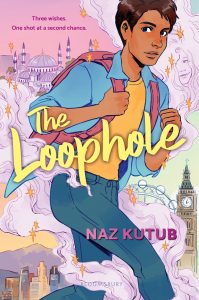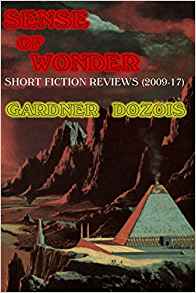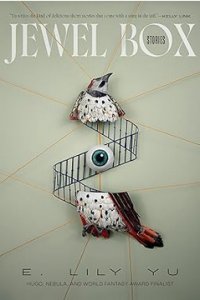Alex Brown Reviews The Loophole by Naz Kutub
 The Loophole, Naz Kutub (Bloomsbury 978-1-54760-917-8, $24.99, 336pp, hc) June 2022.
The Loophole, Naz Kutub (Bloomsbury 978-1-54760-917-8, $24.99, 336pp, hc) June 2022.
Debut author Naz Kutub’s The Loophole may be light on fantasy, but is nevertheless well worth the time for fans of young-adult fantasy fiction. Split between a present-day gay teenager on a quest to find his missing ex, scenes of said teen lovers during their high school romance, and an ancient story about two lovers separated by magic and prejudice, the novel jumps through time and place at a thrilling pace.
Sayyed is a 17-year-old Indian Muslim kid struggling to balance the openness and freedom of Los Angeles and the bigotries and inflexible rules of his domineering immigrant father. His mother and younger sister, while loving, do not give him all the support he needs. His mother protects him as much as she can, but it’s not enough to stop her husband’s violent words or actions. His sister has agreed not to tell anyone about Sy being gay, but in the meantime he must put up with her lectures on how his identity goes against their beliefs.
Sy’s only outlets are his job at a local coffee shop and his boyfriend – make that ex-boyfriend. Sy and Farouk kept their relationship secret for months, largely because Sy was unwilling and unable to come out. Farouk and his coffee shop supervisor Dzakir showed him how supportive a queer found family could be. After Farouk and Sy break up, Sy stays behind at the cafe while the boy he still loves wanders over to the other side of the world to find himself. Much to Sy’s horror, Farouk suddenly disappears.
Enter Reggie, a localized tornado of a young woman. Exorbitantly wealthy and unencumbered by responsibility, Reggie spends all of her time flitting around. She attaches herself to no one and drowns her feelings in alcohol. Until she meets Sy. Reggie offers Sy the reunion of a lifetime. All he has to do is make a wish. So he does. He wishes first for a million dollars – and poof!, the money appears in his bank account – and second to be reunited with the boy he loves. Reggie and Sy head off on a whirlwind adventure across England and North Africa as they trail in Farouk’s footsteps. Is Reggie really a djinn, or is she just some heiress with too much time and money on her hands? The answer may lie in the interstitial scenes of the story of Hamza and Delima, Kutub’s take on the Orpheus and Eurydice myth.
Kutub keeps his foot on the accelerator for most of the novel. The characters are always on the move, from one room to another, from one country to another. Yet he also allows for moments of contemplation and reflection. Sy is not ignorant of or oblivious to queerphobic and Islamophobic rhetoric, but his relatively sheltered life in LA has protected him from the worst of it. During his travels, he’s rocketed into reality. From encountering Islamophobic immigration officials, to getting swept up in a protest against racism, to visiting a refugee camp, these experiences put his own life into perspective; he sees how big the world really is and how many more options he had than he realized.
Kutub handles the complexity of religion and queerness in a way I really appreciated. I am very familiar with Christian religious and spiritual practices but know little of Islam. However, what I saw with Sy in many ways mirrored the difficult relationship I had at his age with Christianity: the constant questioning, the frustrations with what felt too much like restrictions and denials, the recognition that the people laying claim to that religion may not be modeling the best of it. Sy never considers not being Muslim; if anything, during his quest he discovers his connections to his faith are stronger than he thought. Kutub allows Sy to explore and consider without falling back on the ludicrously oversimplified “organized religion is bad” vs. “organized religion is good” debates. The intersection between religion and culture is a complex and fraught thing, and readers get to watch Sy engage with that in a healthy, non-combative way.
My only moment of pause comes from Sy and Farouk’s relationship. To me, it came off as somewhat co-dependent and unequal. At one point, marriage and having children come up as they plan their futures together, despite them both still being teenagers. Farouk dumps Sy because Sy won’t follow Farouk’s plans, but Farouk doesn’t seem all that interested in what Sy might want (not that Sy even knows what he wants). Despite my hesitations, there’s nothing unrealistic about the feelings underpinning their relationship. The foundation their relationship is built on isn’t all that solid, but it is an adequate reflection of how all-consuming a romance can feel to young adults, especially that first relationship, where everything is new and untested and exciting.
With Naz Kutub’s charmingly colloquial writing style and his compelling cast of characters, The Loophole made for a quick yet meaningful read. I can’t wait to see what Kutub writes next. Publishing industry, give me more queer Muslim YA, please and thank you!
Alex Brown is a queer Black librarian and writer. They have written two books on the history of Napa County, California’s marginalized communities. They write about adult and young adult science fiction, fantasy, and horror as well as BIPOC history and librarianship. Diversity, equity, inclusion, and access set the foundation of all their work. Alex lives in Southern California with their pet rats and ever-increasing piles of books.
This review and more like it in the August 2022 issue of Locus.
 While you are here, please take a moment to support Locus with a one-time or recurring donation. We rely on reader donations to keep the magazine and site going, and would like to keep the site paywall free, but WE NEED YOUR FINANCIAL SUPPORT to continue quality coverage of the science fiction and fantasy field.
While you are here, please take a moment to support Locus with a one-time or recurring donation. We rely on reader donations to keep the magazine and site going, and would like to keep the site paywall free, but WE NEED YOUR FINANCIAL SUPPORT to continue quality coverage of the science fiction and fantasy field.
©Locus Magazine. Copyrighted material may not be republished without permission of LSFF.







